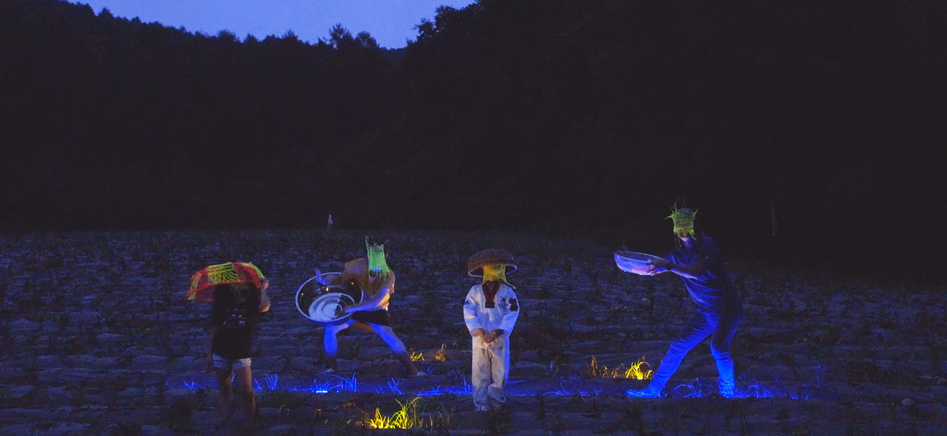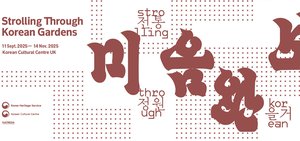A Viewing Room: Rice Brewing Sisters Club

Online exhibition: Moving Images
Rice Brewing Sisters Club, Mountain Storytellers, Storytelling Mountains: A Tale Theatre, 11th - 17th May, 2021
From home ground to homegrown. A grain to the circle. Body to body. This filmic pairing of Cheopcheopdamdam Iyagigeuk (2020) [loosely translated as Mountain Storytellers, Storytelling Mountains: A Tale Theatre] and A great circle with no rim acknowledges the antipodal conjunction between the UK and Korea, and its invariable connotations of here/there, and home/away. The films are linked by their similar concerns of centring an embodied reconnection to our environment, and employing poetic and performative collective expressions that connect the granular to the social and political.
Cheopcheopdamdam Iyagigeuk is the first film by the eco-feminist Rice Brewing Sisters Club (RBSC). RBSC comprises three artists: Hyemin Son, Aletheia Hyun-Jin Shin and Soyoon Ryu, who formed as a collective that identify as sisters whose artistic methodology employs the concept of "social fermentation" with the medium of rice - a dietary staple that entangles historical, cultural and political narratives for vast populations across South, Southeast, East Asias and its diasporas. RBSC was formed in 2018, after Son explored in a 2017 UK residency how to find new and adaptive ways in the UK to process and create the Korean rice wine with what was possible and available. RSBC have since worked in close partnership with multiple independent producers (farmers, brewers, writers, artists, theorists etc) and community organisations both within and outside Korea to experiment with brewing and fermenting with diverse participatory and bodily processes of creation.
Cheopcheopdamdam Iyagigeuk presents an experimental video where the poems and stories that chapter its segments are based on collective oral histories and co-imagining of folk tales, crafted with local collaborations and feature characteristic Korean popular inclination towards wordplay. Both human/non-human actors, performed by the residents and objects of Deokgeo-ri, Bongpyeong, South Korea, prance and gesticulate on a shared forest and agrarian stage, enacting fantastical interspecies tableaux of cooperation and coexistence.
The film expresses RBSC’s divestment in durational communal labour as an approach that creates alternative social relations, a form of relational and dialogic aesthetics as well as activates the traditional Korean collective consciousness of “woori”*, that perhaps could even be read as an extension of the Korean minjung movement with its engagement with the political conditions underpinning social issues. From its genesis, the collective name and first workshop were dedicated in solidarity to its participants that were involved in the concurrent MeToo movement in Korea. RBSC extended socio-political engagement with an eco-feminist agenda that is intertwined with the project’s concern with recuperating post-capitalist planetary depletion of resources via feminist agricultural movements in Korea. For example, one of their feminist farmer partners, Sister’s Garden, is an independent producer of rice amongst other local seasonal produce, which is sold directly via the market and online to consumers, and a portion of their yearly native rice harvest goes into the seed farm operated in the Sister’s Garden for preservation of species and the next year’s cycle.
Via wine and art-making congregations, RBSC wish to share their cross-disciplinary camaraderie and epicurean enjoyment, but more importantly, they aspire to a collective spirit that animates other bodies and voices alongside their own to co-create new imagined realities.
* Hee An Choi, A Postcolonial Self: Korean Immigrant Theology and Church, State University of New York Press 2015, c1.
Artist Bio:
Rice Brewing Sisters Club (RBSC) is a collective of sisters who works with the concept of "social fermentation" as an art form. They expand the concept of fermentation beyond biochemical transformation, to an open-ended practice that gives birth to new synergistic modes of brewing and fermenting. They also experiment with the “social” and the “relational” by traversing multiple fields including visual art, performance, cooking, creative writing, oral history, ecological thinking, and auntie wisdoms. Operating on a yearly membership, RBSC takes collaboration as a core method. They collaborate within and beyond the boundaries of a collective, host open-ended platforms, and create a network of rice eaters and past-present-future dwellers that are both human and more-than-human.
Rice Brewing Sisters Club's interview
Credit:
This video has been selected by Annie Jael Kwan




